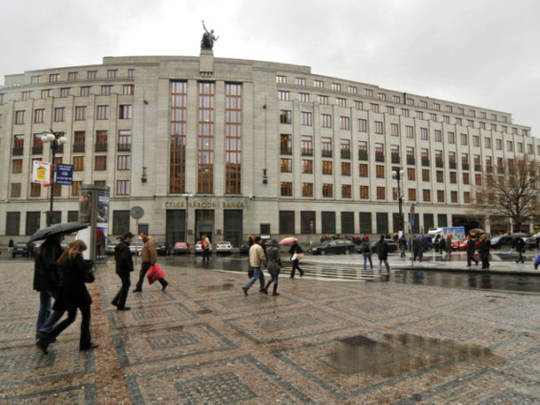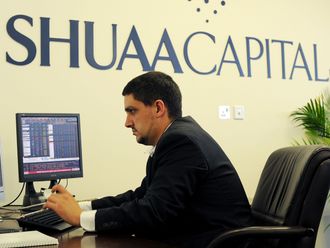
Prague: The Czech central bank will probably refrain from cutting interest rates again on Thursday, after reducing borrowing costs for the first time in two years in June, as a weaker koruna eases monetary conditions.
Policymakers will keep the benchmark two-week repurchase rate at a record-low 0.5 per cent, a quarter-point below the European Central Bank’s main rate, according to the forecasts of 19 of 20 economists in a Bloomberg survey. One predicted a quarter-point reduction.
The Czech central bank cut borrowing costs on June 28, a week before the ECB, to ease conditions in reaction to a worsening economic outlook. The bank may also lower its gross domestic product growth forecast today as the government is pushing through new measures to curb the budget deficit, including higher taxes, which may further damp domestic demand.
“Given the low level of rates, and the fact that the currency has remained pretty weak versus both the euro and the US dollar since the June meeting, it is plausible to expect the CNB to hold fire for at least an extra month,” Pasquale Diana, an economist at Morgan Stanley in London, said in a July 27 e-mail. “Even if rates are on hold, we still expect a downbeat macro message, which would reinforce the bank’s implicit bias for a softer koruna.”
Lower interest rates have helped reduce Czech borrowing costs this year, with the yield on the 5-year government bond falling to a record-low 1.32 per cent on July 18, according to data compiled by Bloomberg. The yield was 1.33 per cent today. The koruna has weakened 1.2 per cent to the euro in the past three months, the third-biggest loss among 25 emerging-market currencies tracked by Bloomberg.
Governor Absent
Central bank Governor Miroslav Singer, who secured a majority of the seven policy makers for a reduction after being outvoted in his attempt to cut rates in May, will miss the session, the bank said.
Czech rate setters are assessing the impact of the government’s tax increases on shop prices and the effects of the euro area’s sovereign-debt crisis on the economy. The lower house of parliament on July 13 approved new measures, including an increase in the sales levy and a new income tax for higher earners, to cut the fiscal gap below the European Union’s limit of 3 per cent of GDP next year.
Economic output fell 0.8 per cent in the first quarter from the final three months of 2011, the second contraction in as many quarters, as households curbed spending in response to a worsening economic outlook across Europe. The economy relies on demand for cars, auto parts and electronics goods from the EU, the market for about 80 per cent of Czech exports.
Inflation Quickens
The inflation rate rose to 3.5 per cent in June, from 3.2 per cent in the previous month. The reading was 0.1 percentage point lower than the central bank forecast. Inflation relevant for monetary policy, defined as price growth adjusted for the primary impact of changes in indirect taxes, accelerated to 2.2 per cent, exceeding the bank’s 2 per cent target.
Czech central bankers supporting the cut differed in their assessment of inflation trends from policy makers in Poland, the EU’s largest post-communist economy. The Narodowy Bank Polski was the only bloc member to increase borrowing costs this year as inflation has exceeded its 2.5 per cent target since October 2010.
Decisions on interest rates are influenced by koruna moves. A stronger currency tames inflationary pressures while a weaker one makes imports more expensive, which may stoke price growth. The central bank forecasts the koruna will average 24.7 to the euro in the second quarter and 24.6 in the third quarter. The rate has averaged 25.5 since the last monetary meeting on May 3.
New Forecasts
The Czech central bank in May forecast the economy to expand 1.9 per cent next year, while saying new tax increases would curb growth to 1.1 per cent. The bank’s alternative scenario, which takes into account the Cabinet’s fiscal measures, also assumes lower market interest rates next year.
Retail sales declined for a third month in May and consumer confidence fell to the lowest in almost 13 years, showing fading domestic demand in the economy.
“There is basically no credit and money-supply growth, and money velocity continues to contract, indicating tighter, not easier monetary conditions,” Danske Bank AS analysts said in a July 26 report. “There is no doubt that the central bank should implement further monetary easing, preferably in the form of quantitative easing, but we are also fully aware that this is not the view of the majority of CNB board members.”












